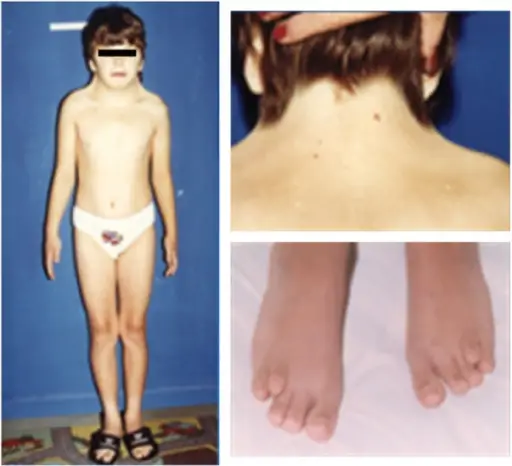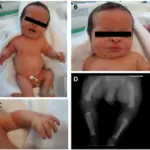Turner syndrome is a genetic condition in which a female is partially or completely missing an X chromosome.
What is the Pathology of Turner Syndrome?
The pathology of Turner syndrome is:
-Etiology: The cause of Turner syndrome is absence of one complete or partial copy of the X chromosome in some or all the cells. In most cases, Turner syndrome is a sporadic event, and for the parents of an individual with Turner syndrome the risk of recurrence is not increased for subsequent pregnancies. While most people have 46 chromosomes, people with TS usually have 45 in some or all cells.
-Genes involved: Monosomy X.
-Pathogenesis: The sequence of events that lead to Turner syndrome is caused by the absence of one set of genes from the short arm of one X chromosome. In patients with 45,X karyotype, about two thirds are missing the paternal X chromosome.
How does Turner Syndrome Present?
Patients with Turner syndrome typically female present at any age range. Often, it is diagnosed at birth due to heart problems, an unusually wide neck or swelling of the hands and feet. The symptoms, features, and clinical findings associated with Turner syndrome include short stature, ovarian dysgenesis, shield chest, bicuspid aortic valve, coarctation of the aorta, lymphatic defects, horseshoe kidney, high-arched palate, shortened 4th metacarpals.
How is Turner Syndrome Diagnosed?
Turner syndrome is diagnosed by amniocentesis or chorionic villus sampling during pregnancy (prenatal). Turner syndrome can be diagnosed postnatally at any age. A karyotyping is the test of choice to diagnose Turner syndrome.
How is Turner Syndrome Treated?
Turner syndrome is treated with estrogen replacement therapy, and growth hormone. Most of these significant conditions are treatable with surgery. Reproductive technologies have also been used to help women with Turner syndrome become pregnant if they desire.
What is the Prognosis of Turner Syndrome?
The prognosis of Turner syndrome is good. Patients with Turner syndrome have an increased mortality rate, three times greater than the general population. Cardiovascular disease due to coronary heart disease and stroke in older patients is a significant factor. Of the congenital cardiovascular disease, an aortic aneurysm is the largest cause. Patients also demonstrate an increase in mortality due to pneumonia, diabetes, epilepsy, liver disease, and kidney disease.



